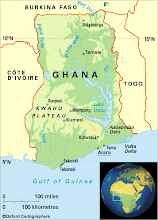The strategic plan identifies the District’s main priorities and builds upon the Ministry of Education’s Mission Statement – a copy of this is on the Director’s office door.
The strategic plan has four thematic areas that relate to: the quality of education; equitable access to education; management for efficiency; science, technology and vocational education and training.
The Millennium Goal of ensuring all children across the world receive free primary education has led to an increase in enrolment in Ghana that has placed an enormous strain on the existing infrastructure. The school building programme, as well as teacher recruitment and training, is lagging way behind demand. This means that class sizes are extremely large, especially in the kindergarten and early primary years. For the 2009-10 academic year, the teacher (trained and untrained) student ratios for the different stages of education are as follows:
Kindergarten (KG) 117
Primary 46
Junior High School 21
Insufficient classroom space has also resulted in an increase in the number of children being taught in “schools under tress”. In the Talensi-Nabdam District there are forty-two such schools.
As well as the “schools under trees”, there are also eleven schools that have dilapidated buildings. Some of these are dangerous and should really be demolished.

In addition to the lack of classrooms, there are 24 schools in the District that do not have any sanitary facilities, i.e. toilets, for either the children or staff to use and despite temperatures often exceeding 40 degrees at this time of year, there are still schools where children do not have access to drinking water.
Recently, the Government of Ghana quite rightly recognised the importance of ICT to the country’s future development and declared that ICT would now be a compulsory subject in all Basic Schools. Great in theory. However, this is a major challenge for a District that only has 5 schools with electricity (out of a total of 144 schools) and of these five only two have a couple of computers between them! Some classrooms do not even have a chalkboard. As a result teachers have to make do with whatever is available.
I met one Headteacher this week who explained that his school’s roof needed repairing – obviously a situation I could empathise with. However, his roof didn’t need repairing because of poor workmanship, but because vampire bats were getting into the roof space and urinating over the textbooks!
Some communities are trying to address the shortage of classrooms themeselves, but whist it is possible for them to make the walls using traditioal methods and volunteer labour at no cost, money is needed to buy the materials for the roof. Also, as you can see from the images below, the lack of windows for light and ventilation in traditional mud classrooms means the structures are not as conducive to good learning as properly built classrooms.
Despite Basic School education being free in Ghana, it is still a significant burden for many families to send their children to school. Uniform, exercise books and equipment have to be purchased, and of course if the child is at school then they are not around to help with the many other things that need to be done. As a result the drop-out rate is high, especially amongst girls. It appears that the Millennium Goal of ensuring all children receive a free primary school education has not been fully thought through by international policy makers, as the infrastructure has not been put in place to ensure that children going to school are able to receive the quality of education needed to genuinely make a difference to their life chances – despite the best effort of some of their teachers.





















































